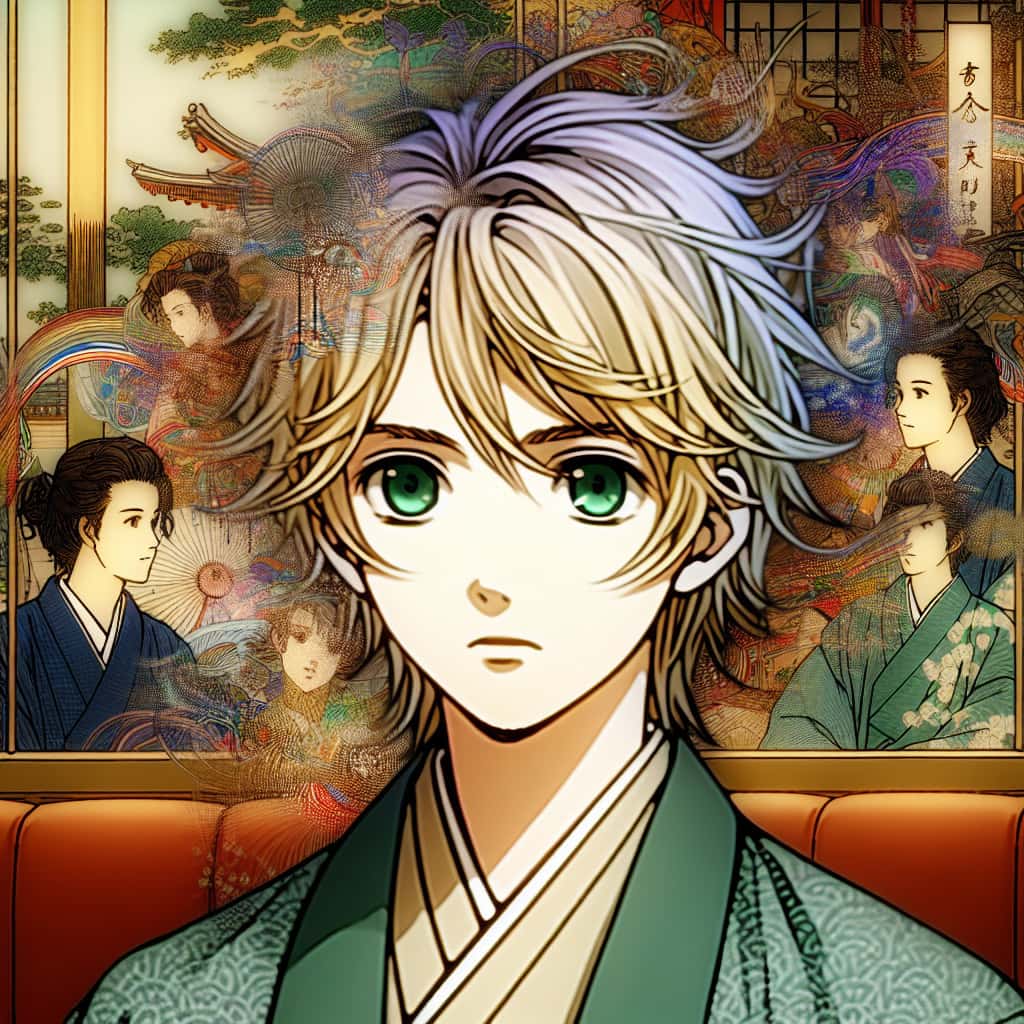Hello, my name is Max from Hakone. We are a Japanese culture agency based in Nürnberg, Germany. Are you looking for a knowledgeable and engaging speaker to share insights on Japanese culture? Look no further! Our team of experts can provide an authentic and informative experience for your event or organization. Contact us today to learn more about our services.
Description
Introduction to Japanese Culture Speaker Services in Germany
At Hakone, we specialize in bringing the vibrant and fascinating world of Japanese culture to the German market through our speaker services. Imagine a captivating presentation that transports your audience to the bustling streets of Tokyo, the serene temples of Kyoto, or the cherry blossom-filled parks of Japan. Our speakers are not just experts in their field; they are storytellers who can engage and inspire your guests with tales of tradition, innovation, and everything in between.
Why Choose Hakone for Japanese Culture Speaker Services?
- We have a deep understanding of both Japanese and German cultures, allowing us to bridge the gap and create meaningful connections.
- Our speakers bring authenticity and passion to their presentations, ensuring that your event leaves a lasting impression on attendees.
- We tailor our services to suit your specific needs and audience demographics, guaranteeing a customized experience every time.
Understanding the Importance of Cultural Sensitivity in Business
Cultural sensitivity is not just a buzzword; it’s an essential aspect of successful business interactions in today’s globalized world. At Hakone, we emphasize the importance of cultural awareness and respect when conducting business between Japan and Germany. Understanding cultural nuances, communication styles, and etiquette can make or break a deal or partnership. Our speaker services aim to educate businesses on these critical factors so they can navigate cross-cultural interactions with confidence and success.
The Impact of Cultural Sensitivity on Business Relationships
- Building trust: Demonstrating cultural sensitivity shows respect for your counterparts’ traditions and values, laying a solid foundation for trust.
- Avoiding misunderstandings: Miscommunication due to cultural differences can lead to costly mistakes or damaged relationships. Cultural sensitivity helps prevent such misunderstandings.
- Gaining a competitive edge: Businesses that prioritize cultural sensitivity are better equipped to navigate international markets and gain a competitive advantage over those that do not.
Introduction to Japanese Culture Speaker Services in Germany
Japanese culture is rich and diverse, with a long history of traditions that have influenced various aspects of society. When it comes to organizing events or business meetings in Germany, having a Japanese culture speaker can provide valuable insights and perspectives that can enhance the overall experience for attendees. These speakers are well-versed in the customs, etiquette, and practices of Japan, making them ideal guides for bridging cultural gaps and fostering understanding between German and Japanese audiences.
Benefits of Hiring a Japanese Culture Speaker:
- Gain unique cultural insights
- Enhance cross-cultural communication
- Create memorable experiences for attendees
Why Choose a Japanese Culture Speaker?
By choosing a Japanese culture speaker for your event in Germany, you can ensure that your audience receives accurate information about Japan’s history, traditions, and customs. These speakers are not only knowledgeable about their own culture but also skilled in presenting information in an engaging and informative manner that resonates with diverse audiences.
Understanding the Importance of Cultural Sensitivity in Business
Why Cultural Sensitivity Matters
In today’s globalized business world, cultural sensitivity is more important than ever. Understanding and respecting different cultures can help businesses avoid misunderstandings, build stronger relationships with clients and partners from diverse backgrounds, and ultimately improve their bottom line. By embracing cultural sensitivity, companies can demonstrate their commitment to inclusivity and diversity, which can enhance their reputation and attract a wider customer base.
Benefits of Cultural Sensitivity Training
Cultural sensitivity training can provide employees with the knowledge and skills they need to navigate cross-cultural interactions successfully. This type of training can help employees develop empathy, communication skills, and a deeper understanding of cultural differences. By investing in cultural sensitivity training, businesses can create a more inclusive work environment, reduce conflicts, and foster collaboration among team members from different cultural backgrounds.
Tips for Cultivating Cultural Sensitivity
- Learn about different cultures through research, training programs, or interactions with people from diverse backgrounds.
- Avoid making assumptions or generalizations about individuals based on their cultural background.
- Practice active listening and ask questions to clarify any cultural misunderstandings.
- Show respect for different customs, traditions, and beliefs when interacting with individuals from other cultures.
The Benefits of Hiring a Japanese Culture Speaker for Your Event
When planning an event that involves Japanese culture, hiring a Japanese culture speaker can greatly enhance the experience for your audience. These speakers are experts in various aspects of Japanese culture, including history, traditions, language, and business practices. By bringing in a knowledgeable speaker, you can provide valuable insights and information to your attendees that they may not have access to otherwise.
Increased Engagement
A Japanese culture speaker can captivate your audience with engaging presentations that highlight the beauty and uniqueness of Japanese traditions. Their expertise and passion for the subject will shine through, keeping attendees interested and eager to learn more.
Customized Content
One of the key benefits of hiring a Japanese culture speaker is their ability to tailor their presentations to suit the specific needs and interests of your audience. Whether you are hosting a corporate event, educational seminar, or cultural festival, a skilled speaker can adapt their content to ensure it resonates with your guests.
- Provide valuable insights into Japanese customs and traditions
- Enhance cross-cultural communication among attendees
- Showcase the influence of Japanese culture on global markets
Tailoring Presentations to German Audiences
Understanding Cultural Nuances
When tailoring presentations to German audiences, it is important to consider the cultural nuances that may impact how your message is received. Germans value punctuality, professionalism, and precision in communication. It is also important to be direct and straightforward in your delivery, as Germans appreciate honesty and clarity in business interactions.
Adapting Content for Relevance
To effectively engage a German audience, it is essential to adapt your content to be relevant to their interests and values. Researching current events, industry trends, and cultural topics that are of significance in Germany can help you tailor your presentation to resonate with your audience. Including examples or case studies that relate specifically to the German market can also enhance the relevance of your message.
Incorporating Visual Aids and Technology
Germans are known for their love of efficiency and technology, so incorporating visual aids such as charts, graphs, and multimedia elements can help keep their attention during presentations. Using PowerPoint or other presentation software can also enhance the professionalism of your delivery. Be sure to test any technology beforehand to ensure a smooth presentation experience.
Exploring the Rich History and Traditions of Japan
Delving into Ancient Japanese Customs
Japan has a long and storied history that dates back thousands of years. From the ancient rituals of the Shinto religion to the traditional tea ceremonies, there are countless customs that have been passed down through generations. Exploring these traditions can provide valuable insights into the cultural values and beliefs that shape modern Japanese society.
Key Points:
- Shintoism as the indigenous religion of Japan
- The significance of cherry blossoms in Japanese culture
- The art of calligraphy and its importance in Japanese society
Uncovering Japan’s Feudal Past
One of the most fascinating periods in Japanese history is the era of feudalism, when powerful samurai warriors ruled over different regions of the country. Learning about this time period can offer a glimpse into the hierarchical structure of society, as well as the codes of honor and conduct that governed samurai behavior.
Key Points:
- The role of daimyo and shogun in feudal Japan
- The Bushido code followed by samurai warriors
- The impact of European influences during the Edo period
Modern Innovations Rooted in Tradition
Despite its rich history, Japan is also known for its cutting-edge technology and modern innovations. However, many of these advancements are rooted in traditional practices and philosophies. By exploring how ancient traditions have influenced contemporary culture, one can gain a deeper appreciation for Japan’s unique blend of past and present.
Key Points:
- The connection between Zen Buddhism and minimalist design aesthetics
- The influence of kabuki theater on modern performance art
- The integration of traditional woodworking techniques in modern architecture
Highlighting the Influence of Japanese Culture on Global Markets
The Impact of Japanese Pop Culture
Japanese pop culture, from anime and manga to J-pop music and fashion trends, has had a significant influence on global markets. The popularity of these cultural exports has led to a rise in interest in Japanese language and customs around the world. Companies have capitalized on this trend by incorporating elements of Japanese pop culture into their products and marketing strategies to appeal to a wider audience.
Innovation and Technology
Japan is known for its advancements in technology and innovation, which have had a profound impact on global markets. From electronics and automotive manufacturing to robotics and artificial intelligence, Japanese companies are at the forefront of technological development. This influence can be seen in the widespread adoption of Japanese products and technologies in various industries worldwide.
Cultural Diplomacy
Through initiatives like Cool Japan and the promotion of traditional arts such as tea ceremony, flower arranging, and kabuki theater, Japan has actively engaged in cultural diplomacy to showcase its unique heritage to the world. This cultural exchange not only fosters mutual understanding between nations but also creates opportunities for economic cooperation and collaboration across borders.
Enhancing Cross-Cultural Communication with a Japanese Culture Speaker
Understanding Cultural Nuances
When communicating with a Japanese culture speaker, it is important to be aware of the cultural nuances that may impact your interactions. For example, in Japan, there is a strong emphasis on politeness and respect in communication. This means using formal language and titles when addressing others, as well as being mindful of non-verbal cues such as bowing. By understanding these cultural norms, you can ensure that your communication is respectful and effective.
Learning Language Basics
While many Japanese culture speakers may have some proficiency in English, making an effort to learn basic Japanese phrases can go a long way in enhancing cross-cultural communication. Simple greetings and expressions of gratitude in Japanese can show your respect for the language and culture, and help to bridge any language barriers that may exist. Additionally, learning about the Japanese writing system, including kanji characters, can further deepen your understanding of the language and culture.
Tips for Effective Communication:
- Listen actively and avoid interrupting.
- Avoid direct confrontation or criticism; use indirect language instead.
- Show appreciation for their culture by asking questions about customs or traditions.
Showcasing Traditional Japanese Arts and Customs
Preserving Centuries-Old Traditions
Japan is known for its rich cultural heritage, which includes a wide array of traditional arts and customs that have been passed down through generations. From tea ceremonies to kabuki theater, these practices offer a glimpse into Japan’s history and values. By showcasing these traditions, we not only honor our past but also educate others about the beauty and significance of Japanese culture.
Examples of Traditional Japanese Arts
- Ikebana (flower arranging)
- Noh drama
- Sumi-e (ink painting)
- Kendo (martial arts)
Promoting Cultural Appreciation
Through exhibitions, workshops, and performances, we aim to promote cultural appreciation and understanding among both locals and foreigners. By immersing ourselves in these traditional arts, we can gain a deeper appreciation for the craftsmanship, discipline, and beauty that define Japanese culture. Our goal is to inspire others to explore these art forms and carry on the legacy of our ancestors.
Benefits of Showcasing Traditional Arts
- Preserving cultural heritage
- Fostering cross-cultural connections
- Promoting tourism and economic growth
Leveraging Cultural Insights for Business Success in Germany
Understanding German Business Culture
In order to thrive in the German market, it is crucial to understand the unique business culture of the country. Germans value punctuality, efficiency, and professionalism in their business dealings. By leveraging cultural insights, companies can adapt their strategies to align with German expectations and build strong relationships with local partners.
Key Cultural Differences Between Japan and Germany
- Germans tend to be more direct in communication compared to the indirect style often seen in Japan.
- The concept of hierarchy plays a significant role in German organizations, whereas Japanese companies often prioritize consensus-building.
- Germans place a high value on work-life balance, while Japanese employees may work long hours as a norm.
Navigating Cross-Cultural Challenges
Despite some differences between Japanese and German business cultures, there are also shared values such as respect for tradition, innovation, and quality. By navigating cross-cultural challenges with sensitivity and open-mindedness, companies can leverage the best of both worlds to achieve success in the global marketplace.
Creating Memorable Experiences with Authentic Japanese Experiences
Celebrating Japanese Culture Through Immersive Experiences
To truly appreciate Japan’s rich cultural heritage, one must immerse themselves in authentic experiences that showcase its traditions firsthand. Whether it’s participating in a traditional tea ceremony or trying on a kimono for the first time, these activities create lasting memories that connect individuals to Japan’s past while celebrating its present beauty.
Popular Authentic Experiences
- Sushi making classes
- Samurai sword fighting demonstrations
- Ryokan stays for an authentic hot spring experience
Promoting Cultural Exchange Through Tourism
Tourism plays a vital role in promoting cultural exchange between Japan and other countries. By offering authentic experiences that highlight Japan’s unique traditions and customs,
we not only attract visitors from around the world but also foster mutual understanding
and appreciation between different cultures.
Providing Expertise on Etiquette and Protocol in Japanese Business Settings
< h3>Navigating Complex Business Etiquette
< p >In Japanese business settings,
etiquette plays an essential role
in building relationships
and demonstrating respect.
From bowing properly
to exchanging business cards
with precision,
understanding these nuances
is key to success
in professional interactions.< / p >
< h4 > Key Etiquette Practices < / h4 >
< ul >
< li > O – chugen gifts during holidays < / li >
< li > Proper seating arrangements based on hierarchy< / li >
< li > Giving omiyage souvenirs after trips or meetings< / li >
< / ul >
< h3 > Building Trust Through Protocol < / h3 >
< p >By following established protocols
and showing respect for traditional customs,
business professionals can build trust
and credibility with their Japanese counterparts.
Whether it’s addressing someone by their title or observing proper gift-giving etiquette,
these gestures go a long way
in forging strong relationships.< / p >
Building Stronger Relationships through Cultural Understanding
Understanding Different Perspectives
One of the key benefits of cultural understanding is gaining insight into different perspectives. When we take the time to learn about another person’s culture, beliefs, and values, we can better understand where they are coming from in their thoughts and actions. This understanding can help bridge communication gaps and foster empathy in our relationships.
Ways to Understand Different Perspectives:
- Engage in open and honest conversations with people from different cultures
- Read books or watch documentaries about various cultures
- Participate in cultural events or festivals to immerse yourself in a different culture
Fostering Respect and Appreciation
Cultural understanding also plays a crucial role in fostering respect and appreciation for diversity. When we take the time to learn about different cultures, we can develop a deeper respect for the traditions, customs, and practices of others. This respect can help us build stronger relationships based on mutual understanding and acceptance.
Benefits of Fostering Respect and Appreciation:
- Promotes inclusivity and diversity in our communities
- Reduces stereotypes and prejudices towards people from different backgrounds
- Creates a more harmonious and accepting society for everyone
Bridging Cultural Divides
In today’s globalized world, cultural understanding is essential for bridging divides between people from different backgrounds. By actively seeking to learn about other cultures, we can break down barriers that may exist due to misunderstandings or ignorance. Building bridges through cultural understanding can lead to stronger relationships built on trust, empathy, and shared experiences.
Strategies for Bridging Cultural Divides:
- Practice active listening when engaging with individuals from diverse backgrounds
- Show curiosity and ask questions about other cultures without making assumptions
- Acknowledge your own biases and be open to learning from others’ perspectives
In conclusion, learning about Japanese culture from a speaker can be a fascinating and enriching experience. If you’re interested in diving deeper into this topic, be sure to check out our services for more insights and knowledge!













